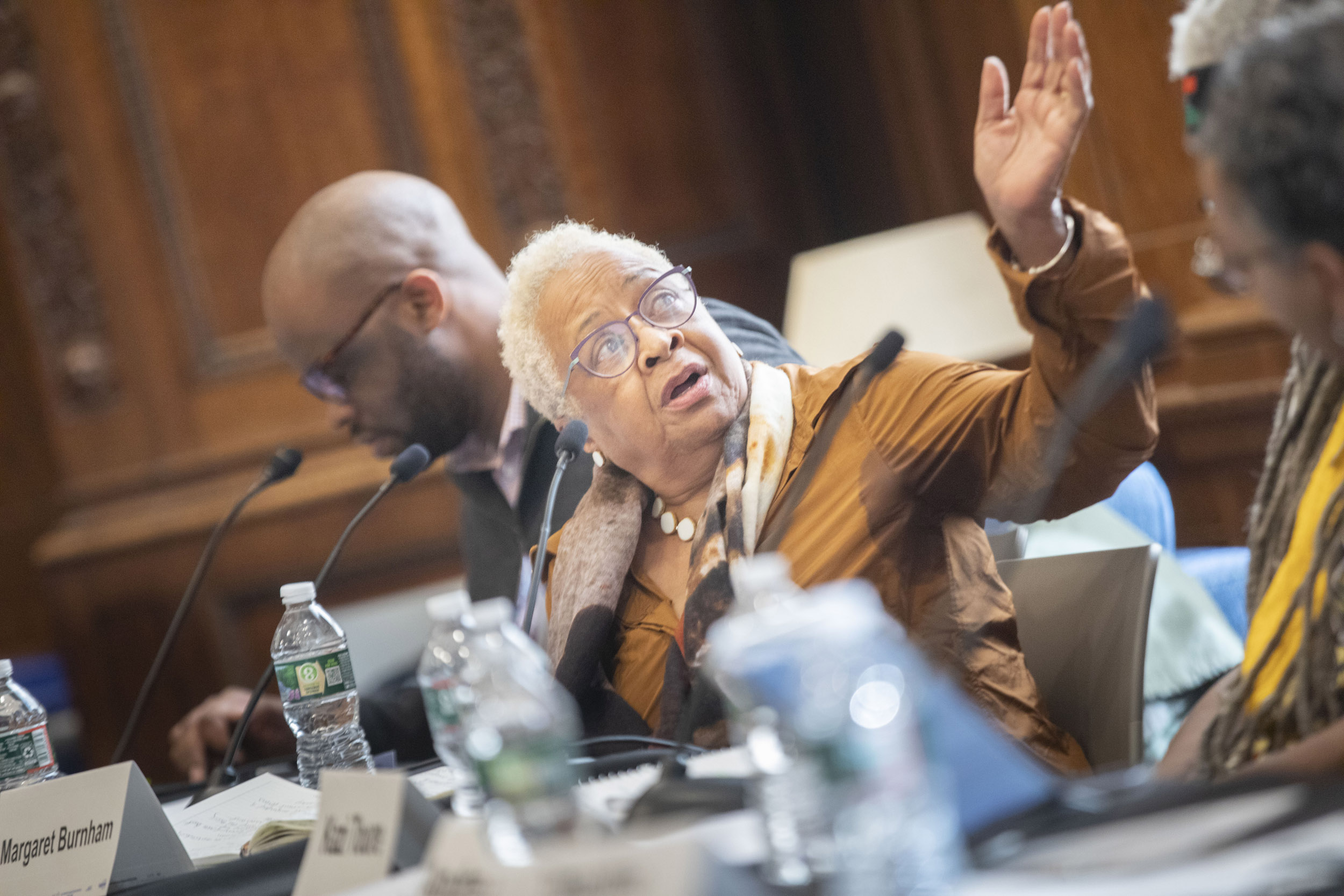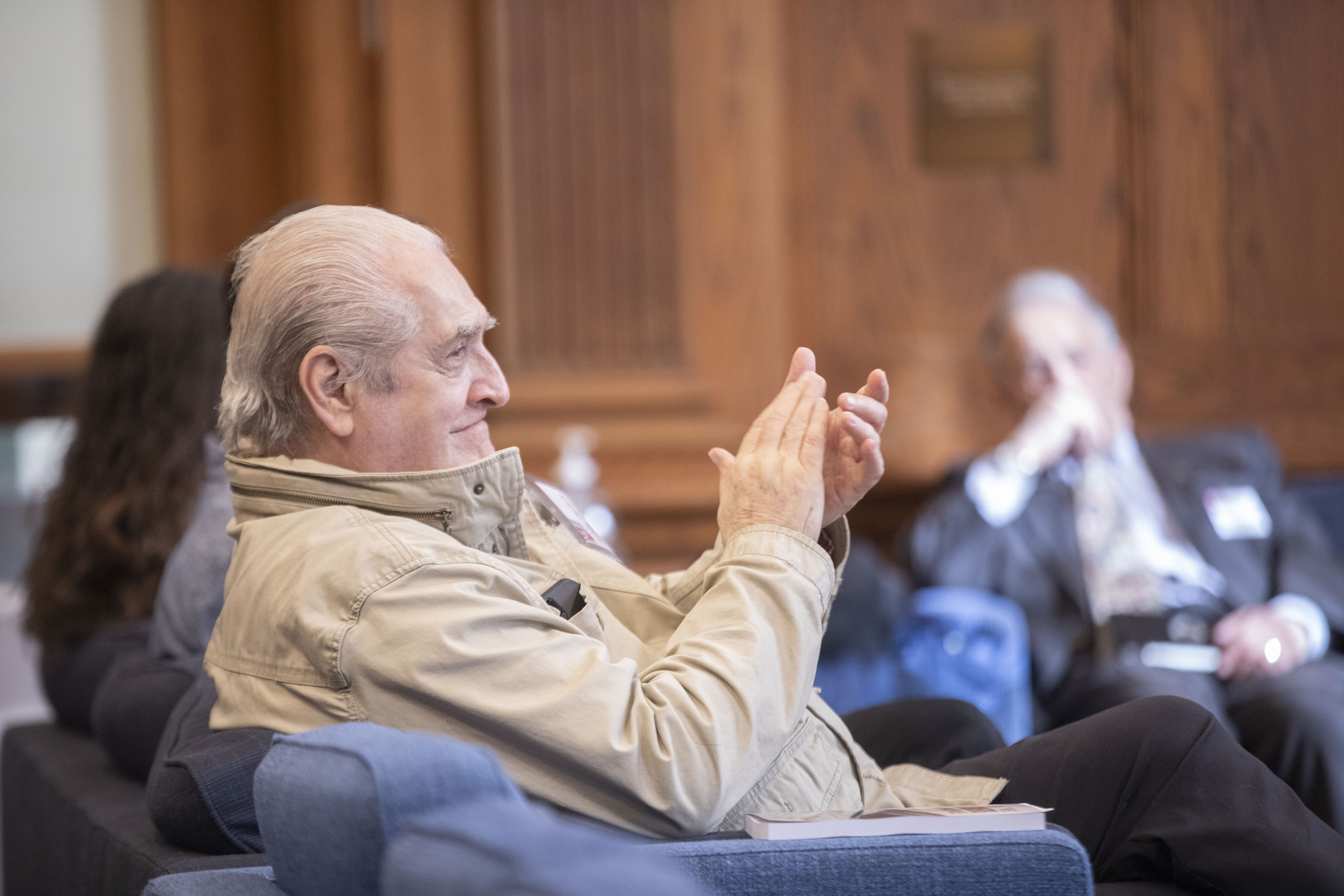
The 12-week takeover of Walpole by the prisoners proved inmates can govern themselves, said panelist Margaret Burnham, a Northeastern University law professor.
Photos by Kris Snibbe/Harvard Staff Photographer
Can prisons be abolished? Look at 1973 Walpole takeover
On 50th anniversary, former prisoners, activists recall when inmates ran prison without incident during guard strike
The topic proved painful, even explosive.
In fall of 1972, inmates at the state prison in Walpole, Massachusetts, peacefully organized themselves into a labor union called the National Prisoners Reform Association. The following March guards went on strike, and NPRA members were given full responsibility for internal operations — including cooking, cleaning, and new prisoner intake.
“Walpole was one of the most dangerous prisons in the country,” recalled former inmate Bobby Dellelo. “We ran it for 12 weeks. Nobody got slapped, let alone killed.”
The 50th anniversary of these events, now viewed as central to the prison abolition movement, were marked recently by a two-day Mahindra Humanities Center symposium at the Barker Center. “The takeover teaches us, first of all, can we abolish prisons?” said Margaret Burnham, a Northeastern University law professor and author of “By Hands Now Known: Jim Crow’s Legal Executioners.” “How can we abolish prisons? And finally, why should we abolish prisons?”
Walpole proved inmates can govern themselves, she said. It also demonstrated that U.S. prisons are “dehumanizing killing machines and therefore need to be abolished.”
The symposium’s participants included inmates-turned-activists, retired administrators, and academics. It began with a screening of the documentary “Three Thousand Years and Life,” filmed in the immediate aftermath of the Walpole takeover. Scenes of convicts quietly painting or churning out license plates for pennies per hour sharply contrasted with talking head interviews in which inmates did little to mask their fury at prison staff.
Before the strike, guards would “come in here and do nothing,” says one inmate in the film. “Now they’re not even coming inside. … They’re punching in and leaving the premises, going back home. And they’re being paid every day. Now this is fraud.”
“Walpole was one of the most dangerous prisons in the country,” recalled former inmate Bobby Dellelo. “We ran it for 12 weeks. Nobody got slapped, let alone killed.”

As NPRA’s inaugural president, Dellelo appeared in the film as a prisoner spokesman and leader. He and another former Walpole inmate named Albert Brown also appeared for a post-screening talk full of emotion. “It’s hard to explain to you,” Dellelo said with a nervous laugh, “because it brings back serious feelings.” At a loss for language, he kept returning to the word “insanity” in describing conditions before and after the takeover.
In a panel the next day, Dellelo articulated his vision for an alternative to institutions like Walpole. “How do we abolish the prison system?” he said. “We do it through attrition. We train prisoners to be carpenters, masons, electricians, teachers.” He acknowledged the presence of dangerous perpetrators. “But that’s a minor amount of the prison population,” he said, urging that these inmates receive intensive inpatient mental health care.
One panel recalled the 1970s founding of Black African Nations Toward Unity, which grew out of a Black history course organized by inmates at Walpole. Another touched on the legacy of John O. Boone, a prison reformer who became the first Black commissioner of the Massachusetts Department of Corrections in 1972 and resigned under fire in 1973 over the turmoil at Walpole.
As Jamie Bissonette wrote in the 2008 book “When the Prisoners Ran Walpole,” the inmates were hardly alone in their opinions of corrections staff. “It became apparent to Boone that the guards at Walpole saw their positions in the [Department of Corrections] less as jobs than as entitlements that they could pass on,” she wrote. Even some of the officers themselves held the group in low esteem. “What I found is I had more respect for those who were incarcerated than I had for the guards,” shared UMass Boston Africana studies lecturer Tony Van Der Meer, a panelist who worked as a Walpole guard in the late 1970s.
Stories of misconduct, systematic racism, and failed reforms finally caused the room to erupt. “I went to the prison system as a 17-year-old kid, man,” blurted out audience member Greg Diatchenko, speaking out of turn during the Boone panel’s question-and-answer session. “I met these guys inside who were abolitionist fighters” he continued, pointing to Brown and several men seated in the back. “They taught me to stand up and fight for what’s right.
“Close the prisons — especially Framingham,” Diatchenko told rows of rapt listeners. “Close it down. Lock it down. And let’s build up. Let’s bring people out in the community.”
In the event’s final panel, abolitionists and activists acknowledged the headwinds they face in the current political climate. “One of the examples we pay close attention to is marriage equality,” offered Andrea James, founder and executive director of the National Council for Incarcerated and Formerly Incarcerated Women and Girls.
She credited the LGBTQ+ movement’s success to on-the-ground organizing, with its emphasis on individual connections. “It’s the hardest work of my life,” said James, who also founded Families for Justice as Healing in Roxbury. “It’s time-consuming. It has to be led by volunteers. We don’t have the money at the National Council. We are women who came out of prison who are trying to advance a different mindset in this country about the use of cages.”
Appearing with James on the March 25 panel, Burnham appealed directly to all the Harvard students in the room. “You may end up before a computer figuring out some policy that will advance our ultimate objective,” she said. “But before you get there, you have to walk with somebody like Andrea. You have to understand what it means to organize.”
Soon, those who wish to learn from Walpole will have the benefit of a digital archive, thanks to Harvard lecturer Thomas Alan Dichter and students in his HIST-LIT 90ES “Prison Abolition” course. Their project, complete with oral histories and digitized records of the Walpole takeover, will launch later this year. In previewing the archive, which will be available to all, Juliette Low Fleury ’23 told the crowd: “It’ll be a good closeout for the 50th anniversary.”




